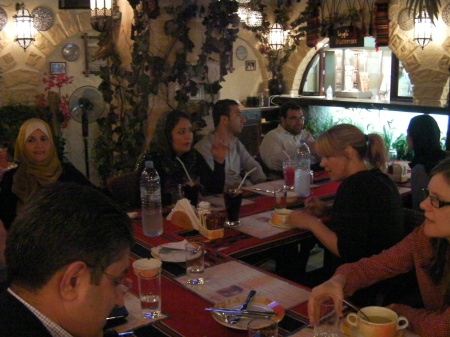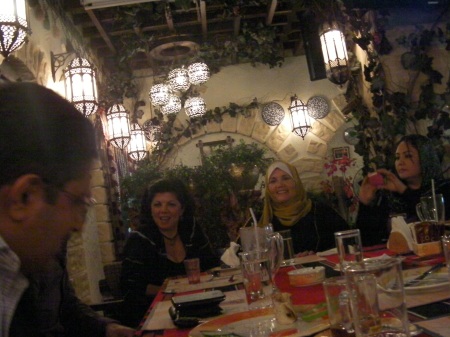
Sharjah International Book Fair 29th Edition

- #shjibf Sharjah International Book Fair #shjibf
- Sharjah, United Arab Emirates
- ExpoCenter 7th - 17th November, 2012. Hours | Saturday - Thursday: 10a.m. - 10p.m.; Friday: 4p.m - 10p.m.
Saturday, 30 October 2010
Emerging Writers Workshop @ Sharjah International Book fair 2010 #shjibf

Poetic East...: I feel the Love of Written Word

I feel; the love of written word
I feel; the pulse of writing pen
I feel; the beats of thinking heart
i feel the words of thinking mind
I feel; the echo of spoken words
I feel; the call of shelved book
i feel; the need to ink the pages
i feel; to color the blank canvas
i feel; the urge to write more..
dedicated to @ShjIntlBookFair
Visiting Authors � Living the Travel Channel
Wednesday was an extraordinary day. The Sharjah International Book Fair is happening currently. In addition to hundreds of publishers and book vendors, this year they have visiting authors from around the world. I was pleased to have the opportunity to hear Samar Dahmash-Jarrah speak. She is a Kuwait born Palestinian and has lived in several of the Middle East countries. She’s an experienced journalist. When 9/11 happened she was living in the States. Even though she is a shy person, she felt it impossible not to speak up and clarify that not all Muslims hate America and not all Muslims are terrorists. This led to her doing a lot of public speaking and media interviews. She then embarked on a wonderful project in which she collected questions that Americans wanted to ask Arabs, then (self-funded) travelled to several Middle East countries and asked these questions of random Arabs she met. These questions and answers are published in her book – Arab Voices Speak to American Hearts (2005). I have yet to read this book, but I will. She is currently teaching an honors course at the University of Southern Florida and is using Facebook to connect her students with Arabs around the world to continue the conversation, if you will. Individuals talking to each other is the best way to take the fear out of the “stranger.” They are no longer strangers.
So, that was a really excellent day, but it got better. There are other authors in town for the book fair – Lisa Dempster (Australia), Zohra Saed & Sahar Muradi (Afghan/Americans), Marsha Qualey (Cairo), and Octavia Nasr (former CNN senior editor of Middle East affairs). So, the Twitter community had a tweetup, of course. Here we are:

Below is PK Gulati, Octavia Nasr, Jenny Saleh, and Zohra Saed.
(published from my iPad)
Qais Sedki and Dr. Naif Al Mutawa: Creating Fun (Yes, Fun!) Arab-oriented Comic Stories for Kids | Read Kutub KIDS
Last night’s five-person “Comics” panel at the Sharjah Book Fair highlighted quite starkly that not all comics are for kids.
The first two speakers—Alan Jay Payne, of the American comic-book company IDW, and Matt Hawkins of the American company Top Cow—showed film clips and images of their products that were clearly not kid-friendly.
Hawkins noted that they’d discovered that the average comic-book reader in the United States is 39 years old.
In a way, of course, this is very heartening, as graphic novels can help bring adult readers back to books. But it’s also an important flag for parents.
After their presentation, award-winning children’s author Qais Sedki (سوار الذهب / Gold Ring, Sheikh Zayed Award 2010) underlined that just because a book has pictures doesn’t mean it’s suited for children.
However—if parents and educators are aware—that’s not a bad thing. Sedki noted “It [a comic] really does act as a perfect stepping stone to getting people back into reading.” And that goes for adults as well as children. Moreover, if children are to read, then we adults also have to be setting an example!
Sedki was particularly passionate about the manga format.
He said that, when kids stop reading, they typically say it’s because books are:
‘boring.’ We all love books and we know that’s not the case. … I think manga, specifically, can probably conquer that. I’ve described it time and time again as the closest thing to a movie in a book.
Sedki said the comic gives a child a great feeling of accomplishment. “I know that [when the child finishes a book], the buzz of having read a book will be there. Once they’re done, and they kind of turn that last page,” they think “you know, I kind of like that.”
I think that is the turning point.
Sedki said that, in too many Arabic books for children, creators think “we have to responsible in the content, so it has to be beneficial.”
And beneficial, in these cases, also often equals boring.
Sedki, of course, believes in benefiting children. But: “If the vehicle carrying it, is not entertaining enough…it will fall on deaf ears.”
And if the book carries no particular “message” to the child at all, and is only entertainment?
It’s a child who read a book and got entertained. That in and of itself is a massive achievement.
Sedki also said that, while Arabic-language translations of other nations’ children’s books is valuable, “I don’t think it’s right to rely on that entirely. We should have our own content in addition to what’s translated.”
Sedki pointed to Dr. Naif Al Mutawa’s The 99 as “the spark that got me thinking about all this.”
I write more about the more grown-up aspects of Dr. Naif’s talk over at ArabLit. Dr. Naif’s comics are written in English—and translated into Arabic, among other languages—but they focus on Arab characters, Arab culture, and Arab stories.
Dr. Naif said that he wanted to create stories based on “those values that we share with the rest of humanity.”
He added:
I believe strongly that if you boil down things to their symbolic level, nobody will disagree with them.
I’ve found English-language The 99s in Cairo, but not the Arabic translations. ISA these distribution issues will be resolved. In the meantime, Dr. Naif said that sample comics in Arabic should be available for download off The 99 site.
Note: Thank you very much to Sharjah Book Fair organizers for putting on this event, particularly fair director Ahmed Al Amri and fair muse @Bodour, who were in the front row during the talk.
Ahmed said, after the talk, that he’d visited the San Diego ComiCCon this past year and “it was really amazing for me…the children, the adults…under one roof, in one exhibition.” ISA the first-ever Abu Dhabi ComicCon, scheduled for next March, will be just as fun.
Booth of the Day at Sharjah Book Fair: Bright Fingers | Read Kutub KIDS
 Gulnar Hajo of the Bright Fingers Publishing House was my find of the day.
Gulnar Hajo of the Bright Fingers Publishing House was my find of the day.
Bright Fingers is a six-year-old publishing house located in Damascus, Syria, and you can find a few of their products at www.brightfingers.com, although none of my favorites. (If you’re in Syria, apparently they have stands in supermarkets! Note to Metro and Ragab Sons: I like this idea.)
Hajo has herself done the lovely illustrations of several books, and has published others, including a wonderful multimedia explosion with buttons. But what I was most excited by were the Arabic-language educational toys. I had been dreaming—yes, these are my modest dreams—about simple Arabic-language puzzle games like the ones you find abundantly in English.
Bright fingers had two varieties: three- and four-letter words. I also got a beautiful punch-out stencil book, where next to a picture of an أرنب is the large letter أ, which you can punch out and use for various tactile projects. You can paint with it, color with it, sprinkle sand through it, and much more. I can’t wait to get it home to the boys!
I will post photographs as soon as I can, but these are both wonderful, hands-on activities for younger language-learners. Thank you, Bright Fingers!
Dr. Naif Al Mutawa: Book Censorship is Killing Arabic � Arabic Literature (in English)

I did have a photo from the panel, but have spilled water on my camera (yes, idiotic) and it's acting funny (imagine that).
Dr. Naif Al Mutawa—creator of extremely successful comic series The 99—had long dreamt of creating comics. When he was in his twenties in his native Kuwait, he wrote and published his first two books. Both were in English.
He wrote in English, he said, because as a younger man—before he’d become exposed to Taha Hussein, Naguib Mahfouz, other greats—”Nothing really grabbed me; nothing was enjoyable [in Arabic].”
His first two books were relatively successful, he said. Then: “Book three got stopped [by censors] and I quit writing at the age of 27. Had I changed a few words, they would have allowed it.” But Al Mutawa was offended by the censorship and didn’t want to change a few words. So “I quit.”
Al Mutawa, who spoke last night to a meager but enthusiastic crowd at the Sharjah International Book Fair, came down firmly against censorship:
In the name of preserving culture, book censorship is really killing it. … People interested in culture are gravitating toward English.
Al Mutawa didn’t mention the wave of censorship that hit the Kuwait book fair earlier this month, but he did say that his home town’s literary festival was the “one book fair” that hasn’t invited him for a visit. (I imagine there are a few in Wyoming and Lichtenstein who’ve also missed out, but take his point.)
Al Mutawa talked about how he later had come to create The 99. At first he resisted the idea, as “I have all these degrees, I’m not going back to writing for children.” But he eventually gave in, and brought his psychologist’s-eye view to the story-creation process:
A good story has a fit. There’s something there inside us already… We’re already wired for it.
He was particularly interested in archetypes and essences:
I believe strongly that if you boil down things to their symbolic level, nobody will disagree with them.
Award-winning graphic novelist Qais Sedki also spoke on the panel last night at the Sharjah Book Fest, and I write more about that over at Read Kutub Kids.
And: In the audience last night, I came across the two main architects of the region’s first ComicCon, set to be held in Abu Dhabi next March. These two guys were brimming—almost brimming over, really—with energy and information, and ISA I’ll pump them for more about science fiction and fantasy novels coming soon in Arabic, new Arabic comics and graphic novels, as well as more details about the upcoming ComicCon.
For those of you who are aspiring graphic novelists or comic-book authors (as you prefer), the ComicCon pair also promises to have practical workshops to help you structure, finalize, polish, finance, and market your work.







